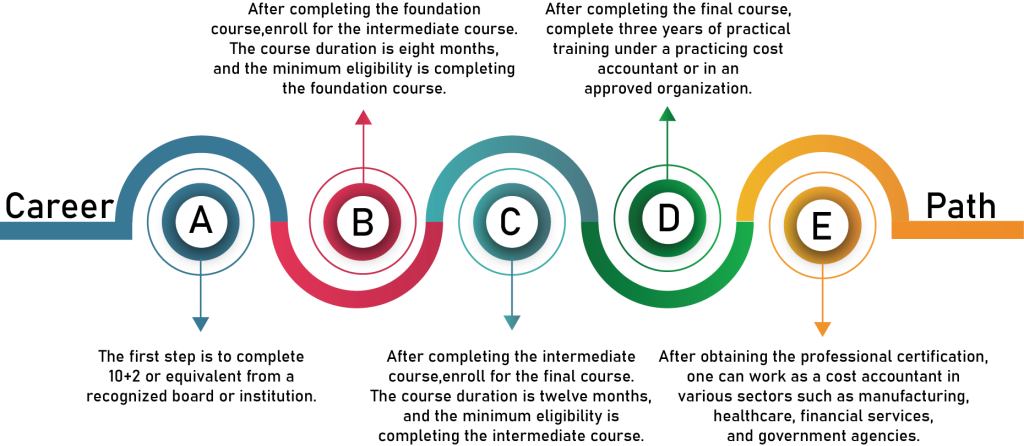Cost accountancy is a branch of accounting that focuses on analyzing, recording, and reporting the cost of producing goods or services. It involves the collection, analysis, and interpretation of financial data related to the production process to help managers make informed decisions.
The primary objective of cost accountancy is to control and reduce the costs associated with producing goods or services. The information generated by cost accountancy helps businesses to manage costs, improve profitability, and make informed decisions regarding pricing, product mix, and resource allocation. Cost accountancy is particularly useful in industries with high production costs, such as manufacturing, construction, and healthcare.
Work description
Cost accountants collect data on various costs related to the production process, such as direct and indirect costs, materials, labor, and overhead expenses. They analyze this data to determine the cost of producing goods or services.
Based on the data collected and analyzed, cost accountants create reports that provide detailed information on the cost of producing goods or services. These reports help managers make informed decisions regarding pricing, resource allocation, and product mix.
Cost accountants work with managers to develop cost standards for different products or services. These standards help in controlling costs and maintaining profitability.
Cost accountants analyze the difference between actual costs and standard costs to identify variances. They investigate the reasons for these variances and make recommendations for improvemen
High Demand
Cost accountants are in high demand in industries such as manufacturing, healthcare, construction, and financial services.
Lucrative salaries
Cost accountants typically earn competitive salaries, and the profession offers opportunities for advancement and professional development.
Opportunities for innovation
Cost accountancy offers a variety of career paths, including management accounting, financial accounting, and internal auditing.
Versatility
Cost accountants play a critical role in helping businesses control costs and maximize profitability, making them valuable members of a company’s financial management team.
Flexibility
The work of cost accountants requires analytical and problem-solving skills, providing intellectual stimulation and opportunities for growth.
High stress
The work of cost accountants can be highly technical and requires a strong understanding of accounting principles and practices.
Long hours
Cost accountants may be required to work long hours, especially during peak periods such as tax season or year-end closing.
Competitive field
The pressure to meet deadlines and produce accurate financial reports can be stressful and demanding.
Constant learning
Cost accountants must maintain their professional certifications through continuing education, which can be time-consuming and costly.
Isolation
The work of cost accountants may be repetitive and less creative than other fields, such as marketing or design.
Eye strain and other physical health issues
The demand for cost accountants may vary depending on economic conditions, and the job market can be competitive.
The cost of pursuing a career in cost accountancy in India may vary depending on the level of education and the institution chosen.
The Institute of Cost Accountants of India (ICAI) offers a foundation course that costs around INR 4,000 to INR 6,000. The cost of the intermediate course ranges from INR 20,000 to INR 25,000. The final course can cost between INR 25,000 to INR 30,000.
In addition to course fees, students will need to pay for textbooks, study materials, exam fees, and registration fees. These costs may add up to several thousand rupees.
Overall, the total cost of pursuing a career in cost accountancy in India may range from INR 50,000 to INR 75,000, depending on the level of education and other expenses.
The cost of pursuing a career in cost accountancy in India may vary depending on the level of education and the institution chosen.
The Institute of Cost Accountants of India (ICAI) offers a foundation course that costs around INR 4,000 to INR 6,000. The cost of the intermediate course ranges from INR 20,000 to INR 25,000. The final course can cost between INR 25,000 to INR 30,000.
In addition to course fees, students will need to pay for textbooks, study materials, exam fees, and registration fees. These costs may add up to several thousand rupees.
Overall, the total cost of pursuing a career in cost accountancy in India may range from INR 50,000 to INR 75,000, depending on the level of education and other expenses.
Strong analytical and numerical skills.
Attention to detail.
Good communication skills.
Ability to work independently and as part of a team.
Ability to manage time effectively and prioritize tasks.
Good knowledge of accounting principles and practices.
Interest in business and finance.
Poor math skills.
Lack of attention to detail.
Lack of interest or passion for the field.
Poor communication skills.
Procrastination and poor time management skills.
Inability to work under pressure and meet deadlines.
Lack of interest in accounting or finance.
Work-life balance
The work-life balance in cost accountancy can vary depending on the employer, industry, and individual job responsibilities.
Cost accountants generally have regular working hours, with overtime only required during busy periods such as year-end or audit season. There is flexibility of work hours in some organizations.
Also, there is opportunity to work in different sectors of the economy, which may offer different work-life balance opportunities.
Work may be demanding and require focused attention for extended periods.
Tight deadlines may require cost accountants to work additional hours during peak periods.
Some cost accountants may be required to travel for work, which can impact work-life balance.

Cost accountants help organizations operate efficiently, which can lead to increased productivity, profitability, and economic growth.
Cost accountants help organizations make informed decisions by providing accurate financial information, which can lead to better decision-making and reduce the risk of financial fraud.
Cost accountants can contribute to social responsibility efforts by helping organizations reduce waste, minimize their environmental impact, and promote sustainable practices.
The demand for cost accountants may lead to job opportunities that prioritize profit over social responsibility or ethical practices.
The focus on financial metrics and cost-cutting measures in cost accountancy may lead to negative social impacts such as job loss or decreased wages for employees.
Cost Audit
Performing audits to ensure compliance with cost accounting standards and identifying areas for cost optimization.
Cost Management
Developing and implementing cost control strategies to optimize resource allocation and reduce costs.
Management Accounting
Providing financial information to help organizations make strategic decisions and manage their operations effectively.
Internal Audit
Conducting audits to assess the effectiveness of an organization’s internal controls, identify areas for improvement, and ensure compliance with regulations.
Corporate Finance
Providing financial analysis and advice on mergers and acquisitions, capital structure, and other corporate finance activities.
Conclusion:
In Conclusion, pursuing a Career in Computer Engineering in India requires a Strong Foundation in math and science, a passion for technology, and a willingness to continuously learn and adapt to New Developments in the industry. With competitive salaries, opportunities for career growth, and the potential to make a significant impact on society, computer engineering can be a Rewarding and Fulfilling Career choice for those who are up for the challenge.




